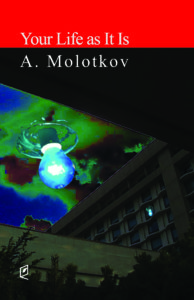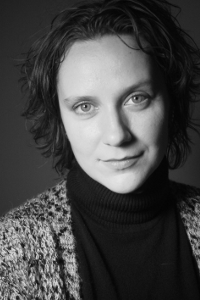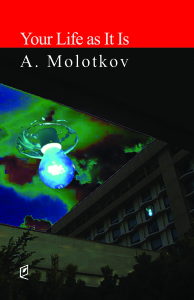Poet A. Molotkov answers a few questions about Your Live as It Is (Accents Publishing, 2014)

Tell us the story of your Accents Publishing book.
“Your Life As It Is” arose from the perception that most of our lives consist of similar repeating building blocks: we go to sleep, we wake up, we form relationships, we suffer loss. I was interested in creating a series that would play with these recurring themes. I started it before a trip to Russia my partner Laurie and I took in 2011. (Russia, the former USSR, is a country where I was born and which I hate intensely.) As we travelled, I tried to write a page or two each day, incorporating small details from the lives of the strangers we ran into. To further enhance the interplay of possibilities, I added a layer in which chess figures appear as characters.
Do you still like it? Why or why not?
Yes, I’m still fond of it. I think it captured what I wanted it to capture, and readers seemed to appreciate it.
What is the highest praise you’ve received for it?
I received an Oregon Literary Fellowship based on the submission of this poem. It ended up becoming the final work in my first full-length collection, “The Catalog of Broken Things” (Airlie Press, 2016).
What didn’t make it in the book?
Everything made it. I wanted the book to represent a generic life most generically.
Is there a poem from the book you’d like to share with the readers of the Accents blog?
The book is a single poem, so I’ll share a page:
You wake up in the morning. The clouds outside your window are strangely immobile, as if they were painted on the glass. Perhaps the wind is still asleep. You realize it would be nice to do something meaningful today, but no specific ideas come to mind.
Your husband’s car is still in the driveway. You are surprised he has not left for work. It’s not like him. You walk out into the living room and find him resting on your beautiful hardwood floor. You don’t feel anything at the thought of his absence.
Your skin is a reflection of your attempts to get closer to the true meaning of your life, but you suspect that it might be inside out. The bishop has given up faith and no longer finds satisfaction in diagonal existence. You remember your own memories better than your past.
You walk outside and find yourself on another street, next to another house. You might have been a different person all along, or perhaps there is a better explanation for all of this.
How did you arrive at the title?
I suppose there is some irony in it. “You” are the character in the book, and to state that “you” represents the reader is both correct and preposterous.
Do you have a favorite Accents Publishing book (other than yours) and if so, which one?
I need to read more of Accents Publishing books, but currently, “Grief & Other Animals” by Patty Paine is my favorite. It’s been a few years since I read it, but I was moved by its handling of grief. It’s a powerful collection.
What would you like to see Accents do going forward?
I feel that the press’s focus is very keen and necessary. Maybe Accents would be interested in publishing full-length poetry collections?
What are you working on now?
I’m always jotting down poems and editing new ones. Recently, I completed a memoir, “A Broken Russia Inside Me”, about my years in the USSR and my immigration. My agent is trying to sell it as I work on my next novel, about hate crime in America. (My previous two novels are unpublished so far, but my agent is working on that as well; I keep my fingers crossed.)
Share a poem, or at least a sentence from your new writing.
This poem was just published by Salamander. It was written in memory of the Portland poet Sam Seskin and titled with a quote from his poem. Many in the Oregon poetry community knew Sam; he was an inspiration. Sam’s first encounter with cancer six years earlier nearly ended his life and allowed him to view the extra time and his impending death with serenity and wisdom. The Inflectionist Review, a small press I co-edit with my friend John Sibley Williams, published his final collection of poems, “To Have Been Snowed On”.
Breath’s Opinion
in memory of Sam Seskin
All I know is: at this
moment, a young scholar solves
a century-old problem. A group of six
climbs Everest, a group of twelve
is rescued from a hurricane. The same
smile faces us in the mirror after
all these years, but we are
so much smarter, so
lovingly open. And just now,
the doctor is born who will
cure everything that ails us, in
other patients. Easy now, don’t
be sad, small engine. There is too much
breathing left to do.

 Born in Russia, A. Molotkov moved to the US in 1990 and switched to writing in English in 1993. Published or accepted by The Kenyon Review, Mad Hatters Review, 2River, Perihelion, Word Riot, Identity Theory, Pif, and many more, Molotkov is winner of New Millennium Writings and Koeppel fiction contests, and a poetry chapbook contest for his True Stories from the Future. He co-editsThe Inflectionist Review and serves on the Board of Directors of Oregon Poetry Association. Molotkov’s new translation of a Chekhov story was included by Knopf in their Everyman Series.
Born in Russia, A. Molotkov moved to the US in 1990 and switched to writing in English in 1993. Published or accepted by The Kenyon Review, Mad Hatters Review, 2River, Perihelion, Word Riot, Identity Theory, Pif, and many more, Molotkov is winner of New Millennium Writings and Koeppel fiction contests, and a poetry chapbook contest for his True Stories from the Future. He co-editsThe Inflectionist Review and serves on the Board of Directors of Oregon Poetry Association. Molotkov’s new translation of a Chekhov story was included by Knopf in their Everyman Series.

 Born in Russia, A. Molotkov moved to the US in 1990 and switched to writing in English in 1993. Published or accepted by The Kenyon Review, Mad Hatters Review, 2River, Perihelion, Word Riot, Identity Theory, Pif, and many more, Molotkov is winner of New Millennium Writings and Koeppel fiction contests, and a poetry chapbook contest for his True Stories from the Future. He co-edits The Inflectionist Review and serves on the Board of Directors of Oregon Poetry Association. Molotkov’s new translation of a Chekhov story was included by Knopf in their Everyman Series.
Born in Russia, A. Molotkov moved to the US in 1990 and switched to writing in English in 1993. Published or accepted by The Kenyon Review, Mad Hatters Review, 2River, Perihelion, Word Riot, Identity Theory, Pif, and many more, Molotkov is winner of New Millennium Writings and Koeppel fiction contests, and a poetry chapbook contest for his True Stories from the Future. He co-edits The Inflectionist Review and serves on the Board of Directors of Oregon Poetry Association. Molotkov’s new translation of a Chekhov story was included by Knopf in their Everyman Series.